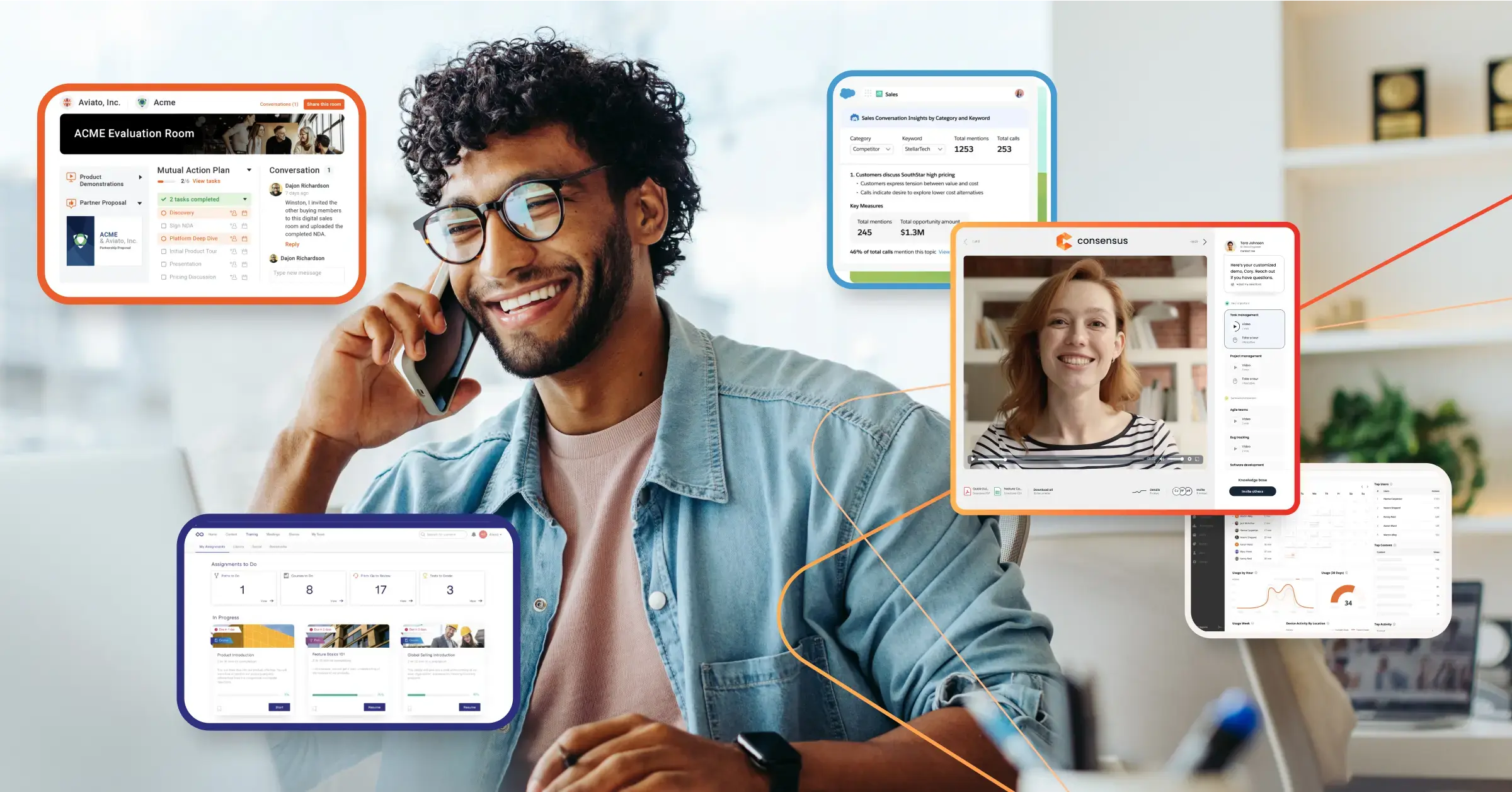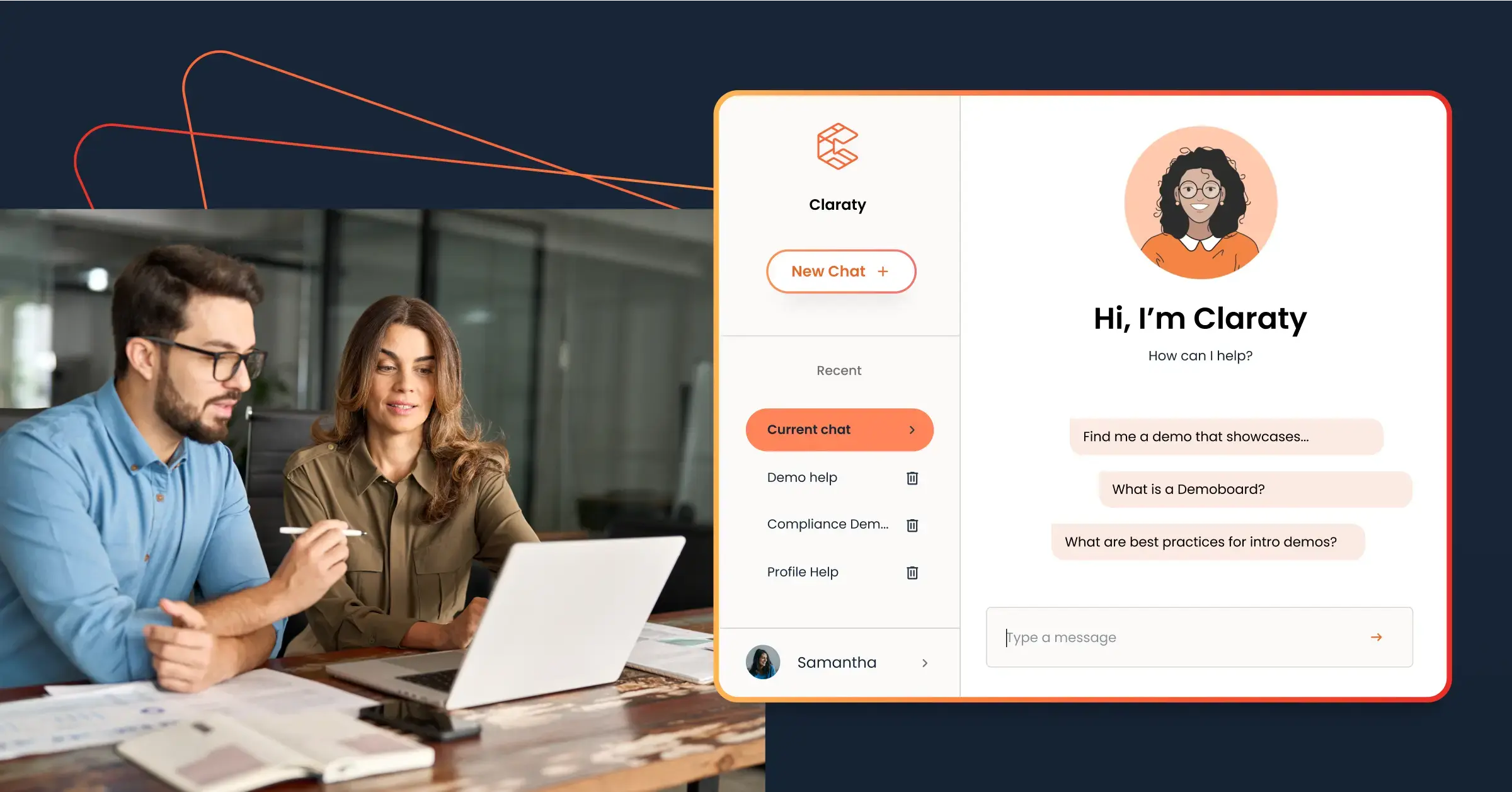Experienced marketing professional who focuses on revenue, enables sales teams, effectively ...
Close more deals with
Demo Automation.
Watch a Demo
Okay, so we’ve got good news…and also a bit of a reality check.
Let’s start with the win: Sales cycles are getting shorter. As of 2024, 87% of B2B buyers say they wrapped up their purchase in under six months. That’s a big leap from the long-haul days of 2018, when nearly half of B2B deals dragged on for seven months or more. We’ll take that progress!
But here’s the thing: six months? Still kind of a slog.
That’s the not-so-good news. Because while a shorter sales cycle sounds like a victory, it still means sales teams are spending half a year chasing decisions. And when you’re staring down revenue targets, that’s time you can’t afford to waste.
This is exactly why sales and revenue teams need sales acceleration tools in their corner. Tools that don’t just chip away at the timeline, but actually help you leapfrog it. Tools that create clarity, reduce friction, and keep deals moving—without burning out your team.
While we’re all about celebrating the wins (let’s give a standing ovation for shrinking sales cycles), we’re also not stopping there. Because the faster we can help buyers buy—and the easier we make it to align stakeholders, answer questions, and coach champions—the faster your team gets to “closed-won.”
So… what does it really take to accelerate B2B sales this year? Let’s talk about the tools that make it happen.
What Are Sales Acceleration Tools?
Sales acceleration tools help businesses move buyers down the sales pipeline more efficiently to shorten the sales cycle. These tools help sellers automate more of the sales process so they can focus on what they do best: engaging with buyers and closing deals.
Types of Sales Acceleration Tools
Considering that the sales pipeline contains multiple steps, sales acceleration tools don’t all serve the same purpose—they may accelerate different steps in the pipeline. Some popular types of sales acceleration tools include:
- Demo automation tools: Demo automation sales acceleration tools provide sellers with one unified place to share interactive, personalized demos, cutting down on the need for unqualified, in-person demos and boosting sales velocity.
- Sales enablement software: Sales enablement tools give sellers centralized access to the resources, messaging, and training they need to sell more effectively. These platforms help ensure consistent, buyer-focused communication across sales stages, reduce onboarding time, and provide analytics on content performance.
- Conversational intelligence: Conversational intelligence tools use AI to analyze sales calls and meetings in real-time. They surface key themes, objections, competitor mentions, and rep performance trends—helping sales leaders coach more effectively and reps improve how they handle buyer conversations.
- Product experience platforms: Product experience platforms optimize a buyer’s entire experience with a company, from the moment they first connect with you to long after they become your champion.
- Prospecting and lead management: Sales acceleration tools focused on prospecting help automate more of the prospecting process, including unpacking large amounts of data to offer insights on potential buyers and generate buyer profiles.
- Digital sales rooms: Digital sales rooms provide a centralized, secure space where buyers and sellers can collaborate throughout the buying journey. These portals house personalized content, demos, proposal documents, and timelines—making it easier for all stakeholders to stay aligned and move the deal forward faster.
- Sales engagement software: With sales engagement software, sellers can track all customer engagement in a single location, set up engagement workflows, and maintain content templates to make it simple to personalize content for buyer needs.
- Product tour software: Product tour software lets buyers take guided tours of products, allowing them to explore the features they want to see the most.
- Email tracking software: Email tracking tools notify sellers when prospects open emails, click links, or view attachments. This helps reps time follow-ups more strategically, prioritize hot leads, and tailor their outreach based on real-time engagement data.
- Sales forecasting tools: Sales acceleration tools focused on sales forecasting use automation and AI to more accurately predict sales forecasts.
- AI sales assistants: AI assistants, like Consensus’ Claraty, are trained in large amounts of expert data to offer best practice insights to further engagement, answer questions, and provide content optimization recommendations.
Best Sales Acceleration Software for Sales Enablement & Engagement
Modern sales teams are under pressure to do more with less—fewer resources, fewer reps, and often, fewer chances to capture buyer attention. That’s where sales enablement comes in. Sales enablement equips your reps with the tools, content, and insights they need to engage buyers more effectively and move deals forward faster.
These are the tools that supercharge your sales enablement strategy—and help your team sell smarter, not harder.
1. Consensus

Consensus is the world’s first Product Experience Platform designed to optimize your buyers’ experience from the moment they first learn about you to long after they become champions. Consensus allows revenue teams to build, share, and track buyer-led product experiences so they can move them down the sales pipeline quickly and efficiently.
Consensus’ full-funnel product experiences focus on four key actions that can engage the three senses that buyers use to buy digital things: sight, sound, and feel. In the digital buying world, it’s hard to address these senses, but Consensus makes it simple through:
- Watching: Buyers tell Consensus what they want to see, and Consensus configures a demo that’s personalized to them, letting them watch demos on demand that give them their first insights into why your product is what they need.
- Trying: With Consensus’ product tours, your buyers get a guided tour of your platform, letting them try your product, specifically the features that they need the most, in a hands-on way.
- Exploring: Through product simulations, buyers can explore your product on their own in a controlled, data-rich environment, no coding required.
- Tracking: With Consensus’ Demolytics, revenue teams can track what’s working and what isn’t, unpack vital intent data, and discover their stakeholders and their champions.

What’s available:
- Demo Creator: Create demos for every stage of your customer journey, designed for a personalized experience every time.
- Product Tours: Show your buyers the features they want to see and tell a story through a unique multimedia tour.
- Automated Product Simulations: Instantly place your buyers in a controlled, data-rich product simulation without the hassle or strain on your engineering team.
- Demolytics: Track how your buyers are engaging with your demos to receive intent data that helps you better qualify and interact with your leads.
- Claraty: Get immediate answers, find the demo that’s most likely to convert, and access industry-led and data-driven insights into how to improve your demo strategy.
- Chrome Extensions: Create video demos instantly with the help of Consensus’s Chrome Extensions, going beyond screenshots to build a more interactive experience.
- Demo Player: Deliver interactive demos on any browser or device.
- DemoBoards: Provide your buyers with a secure, branded, and customized landing page that shows off your product.
- Playlists: Share multiple product experiences in one link, keep content relevant, and guide buyers throughout their journey.
- BuyerBoard: Give your champions a place to show your product to key stakeholders and colleagues.
- Content Downloads: Supplement your demos with additional content that can be easily downloaded by your buyers.
- Public Links and Merge Links: Create custom links that can be shared via your social media, email campaigns, website, and more.
- Demo Library: Build a centralized hub for your demos that’s accessible to your team and easily searchable.
- Screen Recorder: Capture and edit video demos right through Consensus.
What’s not:
- Consensus is focused on enterprise and mid-market companies and may not be ideal for businesses in earlier stages.
Pricing:
- Starter: $600/month
- Pro: $1250/month
- Enterprise: Consensus offers custom pricing tailored to your team’s size and needs. Contact Consensus to request a personalized quote.
Consensus users have seen their sales cycle shortened by 68%. How much more could your revenue teams accomplish with that much more time on their hands?
2. Mindtickle

Mindtickle is all about training and coaching sellers through custom learning paths via its learning management system (LMS). It also focuses on speeding up the sales cycle through AI-driven coaching insights, conversation intelligence, and automated sales forecasting.

Photo courtesy of Mindtickle
What’s available:
- Sales Readiness Index: Identify an Ideal Rep Profile to measure rep preparedness.
- Conversation intelligence: Track conversations and receive insights.
- Digital Sales Rooms: Connect with buyers in one customized place.
- CMS: Manage all content in one place.
What’s not:
- Lacks an intuitive interface
- Has a steep learning curve
- Contains time-consuming training courses
Pricing: Mindtickle doesn’t publicly display pricing.
3. BigTinCan

Bigtincan is all about using automation and AI for sales acceleration. The platform offers several AI-optimized buyer enablement features, including an AI assistant, relationship and conversation intelligence tools, and AI-enabled virtual showrooms and AR cameras.

Photo courtesy of Bigtincan
What’s available:
- GenieAI: Use the AI assistant for search optimization, roleplay capabilities, coaching support, generative text abilities, and meeting and call transcription.
- Bigtincan Studio: Create and edit content with personalization tools.
- Digital Sales Rooms: Personalize sales rooms and offer buyers AI search abilities.
- Analytics: Create dashboards and customizable reports on engagement analytics.
What’s not:
- Lacks robust reporting
- Has frequent bugs
- Contains repetitive and redundant training programs
Pricing: Bigtincan doesn’t publicly display pricing.
4. Showpad

On the buyer enablement side, Showpad provides buyers with custom microsites, personalized content, and AR engagements. But it also boosts sales enablement through sales coaching programs, guided selling support, and seller and engagement analytics.

Photo courtesy of Showpad
What’s available:
- Shared Space: Use customized digital sales rooms.
- Showpad Coach: Develop and scale coaching programs.
- CMS: Store and sync content in one place.
- Content recommendations: Receive AI-generated content recommendations.
What’s not:
- Has a lack of customization options
- Contains limited features in lower-priced plans
- Lacks an intuitive interface
Pricing: Showpad doesn’t publicly display pricing.
Best Sales Acceleration Software for Sales Management & CRM
Can you handle the truth? Sales acceleration tools built for customer relationship management (CRM) help create a unified source of truth so all of your revenue teams can access what they need to sell better and faster. Let’s look at the best sales acceleration tools that can help you manage your sales cycle and customer relationships.
1. Salesforce
Salesforce is an AI-enabled CRM with a suite of tools that automate multiple steps in the sales process. Teams can access AI assistance with lead scoring, lead nurturing, account research, content creation, coaching, conversation intelligence, and revenue forecasting.

Photo courtesy of Salesforce
What’s available:
- Einstein Conversation Insights: Saleforce’s AI bot, Einstein, utilizes conversation intelligence to automate tasks and connect with customers after calls.
- Activity capture: Automatically capture and sync relevant customer and sales data.
- Buyer assistant: Use AI-powered conversations to connect with buyers.
- AI scoring: Identify leads most likely to convert.
What’s not:
- Can be overly complex, especially for smaller businesses
- Is one of the more expensive CRMs on the market
- Contains limited features on lower-priced plans
Pricing: Salesforce doesn’t publicly display pricing.
2. HubSpot Sales Hub

HubSpot’s Sales Hub is HubSpot’s sales software solution that uses AI sales tools to expedite the sales process. Teams can automate tasks while engaging with prospects, receive guided selling insights, and see seller performance through analytics and reporting dashboards. HubSpot also offers a free CRM which comes with features like an AI-assisted email writer, live chat software, and a meeting scheduler.

Photo courtesy of HubSpot
What’s available:
- Breeze Prospecting Agent: Receive prospecting help from an AI assistant.
- Automation: Organize automated emails and follow-up tasks.
- Deal pipelines: Track prospects in one location.
- Guided selling: Get AI-enabled next step guidance.
What’s not:
- Has a dated, slow, and clunky interface
- Lack of live support options for users
- Has a confusing and expensive pricing model
Pricing:
- Free
- Starter: $20 per month per seat
- Professional: $100 per month per seat
- Enterprise: $150 per month per seat
3. Pipedrive

As the name implies, Pipedrive is all about pipeline management. With its CRM and pipeline management features, this sales acceleration tool automates administrative tasks, provides seller performance insights, and tracks engagement and activity data. For more time-saving features, Pipedrive has additional AI-optimized tools, like an email writer.

Photo courtesy of Pipedrive
What’s available:
- Pulse: Score leads, track buyer activity, and get prospecting insights with AI.
- AI sales assistant: Receive AI-driven recommendations on next steps.
- AI deal summarization: Receive deal summaries generated by AI.
- Pipeline reports: Automatically generate reports on a sales pipeline.
What’s not:
- Has some issues integrating with other platforms
- Lacks workflow automation options
- Is an expensive CRM option
Pricing:
- Essential: $24 per seat per month
- Advanced: $49 per seat per month
- Professional: $69 per seat per month
- Power: $79 per seat per month
- Enterprise: $129 per seat per month
4. Outreach
Outreach is a sales execution platform that’s another option for those looking for pipeline management assistance. It offers outreach help through deal insights, conversation intelligence, and AI-driven prospecting. It also provides revenue teams with AI-enabled sales coaching and forecasting.

Photo courtesy of Outreach
What’s available:
- Kaia: Track and analyze conversations.
- Mutual action plans: Develop transparent sales cycles with tasks for buyers and sellers.
- Prospecting agent: Use AI to track insights on prospects, enrich prospect data from multiple sources, and generate relevant content.
- Deal insights: Identify at-risk deals and other actionable insights.
What’s not:
- Has an outdated interface
- Sometimes becomes non-responsive
- Sometimes doesn’t sync data properly from other platforms
Pricing: Outreach doesn’t publicly display pricing.
5. Zendesk

Zendesk hopes that it’ll have your revenue teams feeling zen by offering AI-driven support. You can use Zendesk’s AI agents to answer customer queries, receive AI-generated recommendations for buyer engagement, and automatically generate content.

Photo courtesy of Zendesk
What’s available:
- AI agents: Let AI answer customer questions.
- Copilot: Get auto-assistance with suggested replies and engagement opportunities.
- AI admin tools: Build automated workflows and generate content with AI.
- Centralized workspace: Keep all customer activity in one location.
What’s not:
- Built more for customer service than it is for sales
- Lacks responsive customer support
- Lacks robust search features
Pricing:
- Support Team: $25 per agent per month
- Suite Team: $69 per agent per month
- Suite Professional: $149 per agent per month
- Suite Enterprise: Custom pricing
Best Sales Acceleration Software for Conversation Intelligence
Conversation intelligence can make the difference between following up just in time and in just the right way—and dropping the ball on a perfect engagement opportunity. Pinpoint the best ways to engage with your buyers with these sales acceleration tools focused on conversation intelligence.
1. Fathom

Fathom is a notetaking application that automatically transcribes and summarizes meetings on Zoom, Google Meet, and Microsoft Teams. Fathom’s AI assistant can answer questions about the meeting, integrate summaries and action items into other platforms, and share clips of the meeting. Eventually, it’ll be hard to fathom how you worked without it!

Photo courtesy of Fathom
What’s available:
- Call repository: Store all recorded and transcribed calls in one place.
- Training playlists: Create playlists of the best calls for training purposes.
- Keyword alerts: Get alerted when keywords are mentioned.
- Deal summaries: Use AI to create summaries of all meetings on a particular deal.
What’s not:
- Users report recording issues
- AI can be inaccurate
- Can only transcribe what’s been recorded through Fathom
Pricing:
- Notetaker: Free
Standard Team Edition: $29 per user per month
2. Aircall

Aircall is a communication system and power dialer that’s built with AI features that make conversation intelligence, well, intelligent. Automate call tracking, implementCRM integrations to enrich communications with buyer data, track team performance, and use AI to pull out snapshots of customer conversations, identify keywords, and provide summaries.

Photo courtesy of Aircall
What’s available:
- Shared inbox: Share conversations with team members through a centralized inbox.
- AI trending topics: Pull out key topics from conversations.
- AI summaries: Transcribe and summarize calls and meetings.
- Keyword search: Find the right calls with search functions.
What’s not:
- Sometimes has call connection and integration issues
- Can have incorrect reporting and analytics
- Call quality can sometimes be poor
Pricing:
- Essentials: $40 per license per month, three licenses minimum
- Professional: $70 per license per month, three licenses minimum
- Custom: Custom pricing, 25 licenses minimum
3. Chorus

Chorus is a tool from ZoomInfo that offers conversation intelligence. With instant call transcription and analysis, performance metrics, and contact and company intelligence integrated into CRMs, Chorus hopes users will want to sing its praises.

Photo courtesy of ZoomInfo
What’s available:
- Conversation insights: Transcribe meetings, calls, and emails and pull AI-driven insights.
- Coaching opportunities: Use conversation intelligence to find coaching opportunities.
- Deal intelligence: Track the status of a deal.
- Market intelligence: Capture a customer’s voice to understand how it impacts deals.
What’s not:
- Contains technical bugs
- Users report recording issues
- Lacks an intuitive interface
Pricing: Chorus cannot be purchased individually. It comes with a subscription to ZoomInfo.
Best Sales Acceleration Software for Lead Generation and Management
More than 60% of B2B marketers say that generating high-quality leads is their biggest challenge. These sales acceleration tools help users get not only more leads in their pipeline but also higher quality ones.
1. DemandFarm

Want leads on demand? DemandFarm wants to help. DemandFarm is an account management tool that lets users create and collaborate on account plans, identify growth opportunities, track engagement, and forecast revenue.

Photo courtesy of DemandFarm
What’s available:
- KAM AI: Use AI to locate account risks, discover new opportunities, generate action items, and automate manual tasks like transcribing meetings.
- Scorecards: Score and prioritize opportunities with scorecards.
- Relationship maps: Get an overview of each opportunity.
- Growth planner: Track account plan progress.
What’s not:
- Has redundant and unhelpful features, particularly for small businesses
- Is slow to update data
- Heatmaps are complex and hard to read
Pricing: DemandFarm doesn’t publicly display pricing.
2. LinkedIn Sales Navigator

Navigating the high seas is hard enough—but navigating sales opportunities can be complicated enough to make you want to jump ship. With LinkedIn Sales Navigator, users can uncover stakeholders, track engagement and company data, message prospects, and get insights into account opportunities.

Photo courtesy of LinkedIn
What’s available:
- Industry research: Research industries and competition.
- Contact data: Store up-to-date contact data
- Company data: Track real-time company information.
- InMail: Message prospects through LinkedIn.
What’s not:
- Has an outdated, confusing interface
- Pricing can be steep, especially for small businesses
- Limits the number of InMail messages that can be sent per month
Pricing: LinkedIn Sales Navigator doesn’t publicly display pricing.
3. ZoomInfo

Zoom into account opportunities with ZoomInfo. Prospect and engage customers in one place, receive AI-driven insights into buyers, get recommended actions based on previous interactions, and automate workflows.

Photo courtesy of ZoomInfo
What’s available:
- Contact data: Access a B2B contact database.
- Buyer intent: Use AI to identify high-intent leads.
- Automated workflows: Automate outreach and sales engagement workflows.
- Conversation intelligence: Track and analyze customer interactions.
What’s not:
- Can have inaccurate and outdated contact information
- Can be difficult to find your audience if you work with small businesses
- Can have slow load times
Pricing: ZoomInfo doesn’t publicly display pricing.
4. Kaspr

In sales, ghosting isn’t all that friendly. Kaspr is here to offer businesses all the info they need to keep from getting ghosted. Using Kaspr’s LinkedIn Chrome Extension, users can track real-time customer data, integrate data into CRMs, and access more than 500 million phone numbers and email addresses.

Photo courtesy of Kaspr
What’s available:
- LinkedIn Chrome Extension: Connect Kaspr to LinkedIn to unearth company data.
- Integrations: Integrate Kaspr into an existing tech stack.
- Manual upload: Upload CSVs of leads to add more information.
- Automated workflows: Launch workflows to automatically gather contact info.
What’s not:
- Is primarily for European contact data
- Sometimes has outdated and incorrect contact information
- Users report difficulty with the bulk enrichment features
Pricing:
- Free
- Starter: $59 per user per month
- Business: $99 per user per month
- Enterprise: Custom
5. Leadoo

Ready to be a sales leader? With Leadoo, users can turn website traffic into leads. Engage website visitors, analyze web traffic and conversion rates, gain insights into website visitors and their companies, and personalize website visits.

Photo courtesy of Leadoo
What’s available:
- Conversion Kit: Use tools like Chatbots to engage with website visitors.
- Conversion Insights: Get insights into buyer journeys, marketing campaigns, and website visitor backgrounds and needs.
- Leadoo AI: Create a personalized AI assistant to support your website visitors.
- Personaliser: Customize conversations based on previous interactions with a website visitor.
What’s not:
- Lacks lead filtering features
- AI bots are outdated
- Reporting options are not robust
Pricing:
- Leadoo Lite: Free
- Leadoo Essentials: £699 per month with £2,000 onboarding fee
- Leadoo Pro: £999 per month with £3,500 onboarding fee
- Leadoo Expert: £1,499 per month with £5,000 onboarding fee
- Leadoo Sales: £199 per month for three seats with £39 per month for additional seats
- Leadoo Custom: Custom pricing
Best Sales Acceleration Software for Sales and Revenue Intelligence
More than 80% of companies have missed their revenue forecast in the past two years. These sales acceleration tools make it simpler to predict the future of your sales and revenue.
1. Cognism

Cognism wants to make users more cognizant of their prospects to prevent missing out on sales opportunities. Target ideal customers, receive buyer insights and signals, personalize outreach, and enrich CRMs with prospect data.

Photo courtesy of Cognism
What’s available:
- Diamond Data: Access contact and company data.
- Company insights and signals: Get alerts for company happenings, like funding events.
- Performance metrics: Determine best practices and measure team performance.
- Personalized recommendations: Get AI-enabled recommendations for next steps.
What’s not:
- Contains outdated and inaccurate contact information
- Is primarily filled with European contacts
- Users report being unable to remove their data from Cognism and frequently receive spam because of it
Pricing: Cognism doesn’t publicly display pricing.
2. Gong

Gong.io, which integrates perfectly with Consensus, is a revenue intelligence platform that uses AI to forecast revenue, track performance analytics, optimize sales coaching, and improve buyer interactions. Revenue teams can detect customer trends, find answers to lead-related questions across different accounts, and use prior interactions to boost team coaching.

Photo courtesy of Gong
What’s available:
- Conversation intelligence: Track and analyze customer calls.
- Predictive forecasting: Use AI to find an accurate revenue forecast.
- Pipeline inspection: Get insights into pipeline struggles.
- Data capture: Automatically track and sync customer data.
What’s not:
- AI can sometimes be inaccurate
- Can have call recording issues
- Has a hard-to-use search functionality
Pricing: Gong doesn’t publicly display pricing.
3. Salesloft

Lofty sales goals? Salesloft can help users with revenue goals through its AI-enabled features. Unearth buyer signals through analytics tracking and conversation intelligence, then send revenue teams tasks and information to move buyers down the sales pipeline.

Photo courtesy of Salesloft
What’s available:
- Rhythm: Salesloft’s AI tool that reads buyer signals.
- Plays: Automated one-off tasks based on buyer signals.
- Conversation intelligence: Track and analyze buyer conversations.
- Forecast: Use AI to predict future revenue.
What’s not:
- Integrations don’t always work as expected
- Has limited customization options
- Requires time-consuming setup and onboarding
Pricing: Salesloft doesn’t publicly display pricing.
4. Clari

Need some clari-ty into your revenue forecast? Clari is an AI-enabled revenue platform that allows users to capture sales data, improve pipeline visibility, gain insights into customer activity, and forecast future revenue.

Photo courtesy of Clari
What’s available:
- Capture: Automatically capture sales data and sync with CRMs.
- Groove: Optimize and automate workflows.
- Forecast: Predict future growth with real-time data insights.
- Align: Create mutual action plans.
What’s not:
- Customer support can be non-responsive
- Can have trouble syncing data with CRMs
- Lacks the advanced automation capabilities of similar products
Pricing: Clari doesn’t publicly display pricing.
5. Apollo

Apollo was designed to be an end-to-end sales solution, assisting sales from prospecting through deal closure. The platform offers an AI-enabled pipeline builder, call recorder, meeting scheduler, and data enrichment tools.

Photo courtesy of Apollo
What’s available:
- Apollo AI: Get AI-generated insights into prospects, let AI score leads, automatically generate personalized emails, extract insights from sales conversations, and automate workflows.
- Data enrichment: Fill data gaps in CRMs with Apollo’s sales intelligence features.
- AI call assistant: Record calls and use AI to turn calls into suggested workflows.
- Pipeline builder: Research prospects, create personalized engagement sequences, and automate outreach.
What’s not:
- May contains outdated and inaccurate contact information
- Has a lack of dedicated customer support
- Offers a limited number of credits to contact companies
Pricing:
- Free
- Basic: $59 per user per month
- Professional: $99 per user per month
- Organization: $149 per user per month
What to Look For in a Sales Acceleration Tool
While the right sales acceleration tool will vary based on your needs, here are a few features that you’ll often find in the best sales acceleration tools.
Compliance and Security
Accelerating sales doesn’t mean sacrificing buyer security, especially considering that sacrificing buyer security can mean losing buyer trust. Make sure your sales acceleration tool has measures in place to protect consumer data and is compliant with regulatory laws like the General Data Protection Regulation (GDPR).
Data Quality Maintenance
Bad data is another way to erode buyer trust. If you have incorrect data on your buyers, personalization becomes not so personal. Reaching out to the wrong people can also get you labeled as spam, which can hurt your chances of connecting with the right people. A good sales acceleration tool should have methods to ensure that data is correct and current.
Customization Opportunities
Your product is unique. So, your sales acceleration tool needs to be able to support that uniqueness. With customization options, you can personalize your outreach efforts to target your specific audience, your reporting and analytics to be able to see the info you need, and your content creation to ensure you’re able to properly showcase what makes you special.
Scalability
You want to accelerate your sales to help your company grow, so your sales acceleration tool needs to grow with you. Think beyond what you need right now when you choose a tool and ensure that it’ll be a good fit for you in the future, too. You should be able to add users to your account, showcase multiple products, and allow you to grow your outreach efforts. If you don’t have all this, you’ll likely need to switch to another tool later on, which can result in lost data and content and be time-consuming to do.
Pick the Best Sales Acceleration Tool to Streamline the Sales Cycles and Have Faster Revenue Growth
With the right sales acceleration tools, you can automate time-consuming tasks, track your buyer activity to learn how and when to engage best, find all the info you need on your best buyer, and even predict the future with AI-optimized forecasts.
Consensus is the perfect fit for a modern sales acceleration suite as the world’s first Product Experience Platform. With buyer-centric product experiences that help you boost your buyer enablement, you give your buyers what they want, while providing your revenue teams with more time, support, and reporting.
What better way to accelerate the sales cycle than by giving your buyer the tools to sell themselves on your product?






